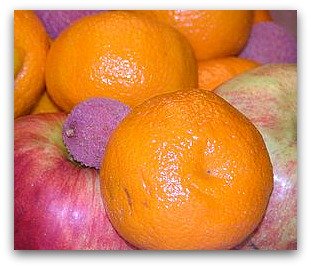Benefits of vitamin C
| Page Content |

|
Introduction
[Top]
The scientific name for vitamin C is ascorbic acid, it is a water-soluble vitamin. Ascorbic acid behaves like antioxidant, so it protects our cells from damage from free radicals.
Benefits of vitamin C
[Top]
Our bodies need vitamin C to produce collagen. Collagen is a protein which we need to help wound healing. Vitamin C also helps the immune system to function well, it helps tooth and bone formation and helps us to absorb iron from plant based foods.
Food sources
[Top]
Even though animals produce vitamin C, they are not the best food sources. The best food sources are fruits and vegetables. The vitamin c is reduced when food is cooked, so it is best to eat vegetables raw if at all possible. The best sources of vitamin c is shown below.
| Raw sweet red pepper | 125 ml | 150 |
| Kiwi | Medium | 71 |
| Lychee | 10 | 69 |
| orange | medium | 68 |
| Raw green peppers | 125ml | 63 |
| Lemon juice | 125 ml | 59 |
| Boiled Broccoli | 125 ml | 59 |
| Concentrated orange juice | 125 ml | 51 |
| Strawberries | 125ml | 44 |
Am I getting enough vitamin C?
[Top]
People who don't get enough vitamin C get a disease called scurvy which is fatal without treatment. Scurvy causes gum inflammation, small purple and red spots on the skin, depression, joint pain, fatigue and bad wound healing. They may also get anaemia.
Recommended amounts
[Top]
| Birth to 6 months | 40 mg |
| Infants 7–12 months | 50 mg |
| Children 1–3 years | 15 mg |
| Children 4–8 years | 25 mg |
| Teenage boys 14–18 years | 75 mg |
| Teenage girls 14-18 | 65 mg |
| Adults (men) | 90 mg |
| Adults women | 75 mg |
| pregnant teenagers | 80 mg |
| pregnant women | 85 mg |
| Breastfeeding teenagers | 115 mg |
| Breastfeeding women | 120 mg |
Groups at risk
[Top]
- Some groups are at risk of not getting enough vitamin C
- Smokers or those who breath in secondhand smoke. Smokers need another 35mg a day than nonsmokers.
- Infants who drink boiled or evporated cows milk
- People with certain types of cancer
- People with malabsorption or kidney disease
- People who do not have a varied diet
Too much
[Top]
Too much vitamin C can cause nausea, stomach cramps and diarrhoea.
Return to natural healing home page
Return to 6 essential nutrients




New! Comments
Have your say about what you just read! Leave me a comment in the box below.